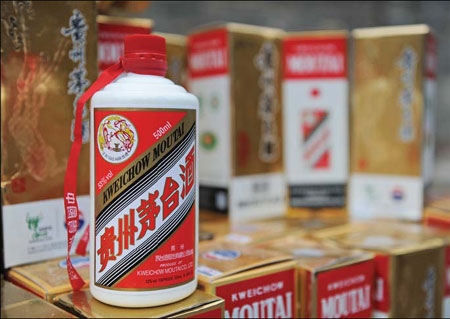Status hard to swallow
Updated: 2012-02-03 10:49
By Qiu Bo (China Daily European Edition)
|
|||||||||||
|
 Liquor products of Kweichow Moutai are getting more and more expensive. [Provided to China Daily]
|
Baijiu maker wants to be seen as affordable as prices rise
Kweichow Moutai Distillery Co, which makes China's most famous white spirit, or baijiu, is a little miffed about its status as a luxury brand.
Or perhaps the company is upset that its Moutai brand isn't as beloved by Chinese millionaires as fashion brands Louis Vuitton, Cartier and Hermes.
The company's source of animosity is the Hurun Best of the Best Awards 2012, issued by the Hurun Research Institute in January. In the press release, the institute ranks Moutai as the fourth most expensive luxury brand in the world.
The Hurun Report, a publication that studies China's upper class and its lifestyles, surveyed 503 Chinese whose individual wealth is more than 10 million yuan ($1.58 million, 1.2 million euros).
The report also lists Moutai as the fourth most valuable brand behind Louis Vuitton, Hermes and BMW, but higher than Mercedes-Benz and Chanel. Moutai officials were quick to criticize the survey partly because it doesn't want to be seen as a brand that is getting more and more expensive for the average consumer.
Nonetheless, the fact is that Moutai is in a strange paradox at the moment. In December 2010, the company raised prices by 20 percent on most of its bottles to be released in 2011. After the price hike, the average price for a bottle of Moutai jumped by 300 yuan for a 0.5 liter bottle to about 1,900 yuan.
Liquor evaluators also are attempting to put prices of vintage bottles of Maotai (the spelling for the generic name of the white spirit) from various Chinese producers of the baijiu on an even keel with some of the most sought-after bottles of French wine.
In a recent auction by Beijing Googut Auction Co devoted only to aged Maotai, Liu Xiaowei, the auction house chairman, put the price of a 1982 vintage bottle of Maotai at between 10,000 yuan and 20,000 yuan.
Moutai is therefore in a quandary. How does it market itself as affordable to consumers while China's rising affluence and growing demand for Moutai as an ideal gift inflate prices?
During this year's Spring Festival, salespeople for Beijing stores that carry Moutai were trying to sell Moutai's flagship "Flying 53 Degree" bottle for more than 2,000 yuan.
What's more, a salesperson for the company, who would only give his surname Yang, says the company expects to raise its current factory gate price to wholesalers of Flying 53 from 620 yuan a bottle to more than 900 yuan.
The increasing enthusiasm has been a boon to Moutai. According to stock information site Hexun.com, the company's stock price in January stood at 190 yuan a share, with market capitalization at approximately 194 billion yuan.
On Jan 18, the company estimated that profits would grow by 65 percent. Its net profits in the first three quarters of 2011 were 6.93 billion yuan, 57 percent higher compared to the same period in 2010.
Moutai is also quickly expanding its production capacity. In 2003, Moutai's annual output was about 10,000 tons. In the past eight years, output has been growing steadily.
"The output in 2011 was 26,000 tons," says Wu Hua, a press officer with Moutai.
Yuan Renguo, Moutai's general manager and board chairman, told China Business News last year that the company's revenue should grow by 8 percent year on year in the next five to 10 years.
But drinkers are complaining that the liquor is getting too expensive.
"Rising costs are a reason (to explain the price hike)," says Liu Wenke, an official with the economic development office of Maotai Town in Guizhou province.
Liu says the price of locally-produced high-quality sorghum used in producing Maotai has tripled in three years since 2008, from 2.4 yuan per kilogram to 7.2 yuan.
There is also limited land in the town, where liquor experts say is the ideal area to produce baijiu because of the mountain waters in Guizhou. That means every time Moutai expands workshops areas and factories, a large amount of compensation has to be paid to families whose homes are demolished to make way for the company's expansion.
The company says in return for the demolition, it hires one member of each uprooted household.
"A new employee earns 60,000 to 70,000 yuan a year," Liu says.
He says in 2011 some 900 households were relocated; in 2012, the figure will be close to 400.
Today's Top News
Rescuers race against time for quake victims
Telecom workers restore links
Coal mine blast kills 18 in Jilin
Intl scholarship puts China on the map
More bird flu patients discharged
Gold loses sheen, but still a safe bet
US 'turns blind eye to human rights'
Telecom workers restore links
Hot Topics
Lunar probe , China growth forecasts, Emission rules get tougher, China seen through 'colored lens', International board,
Editor's Picks

|

|

|

|

|

|





